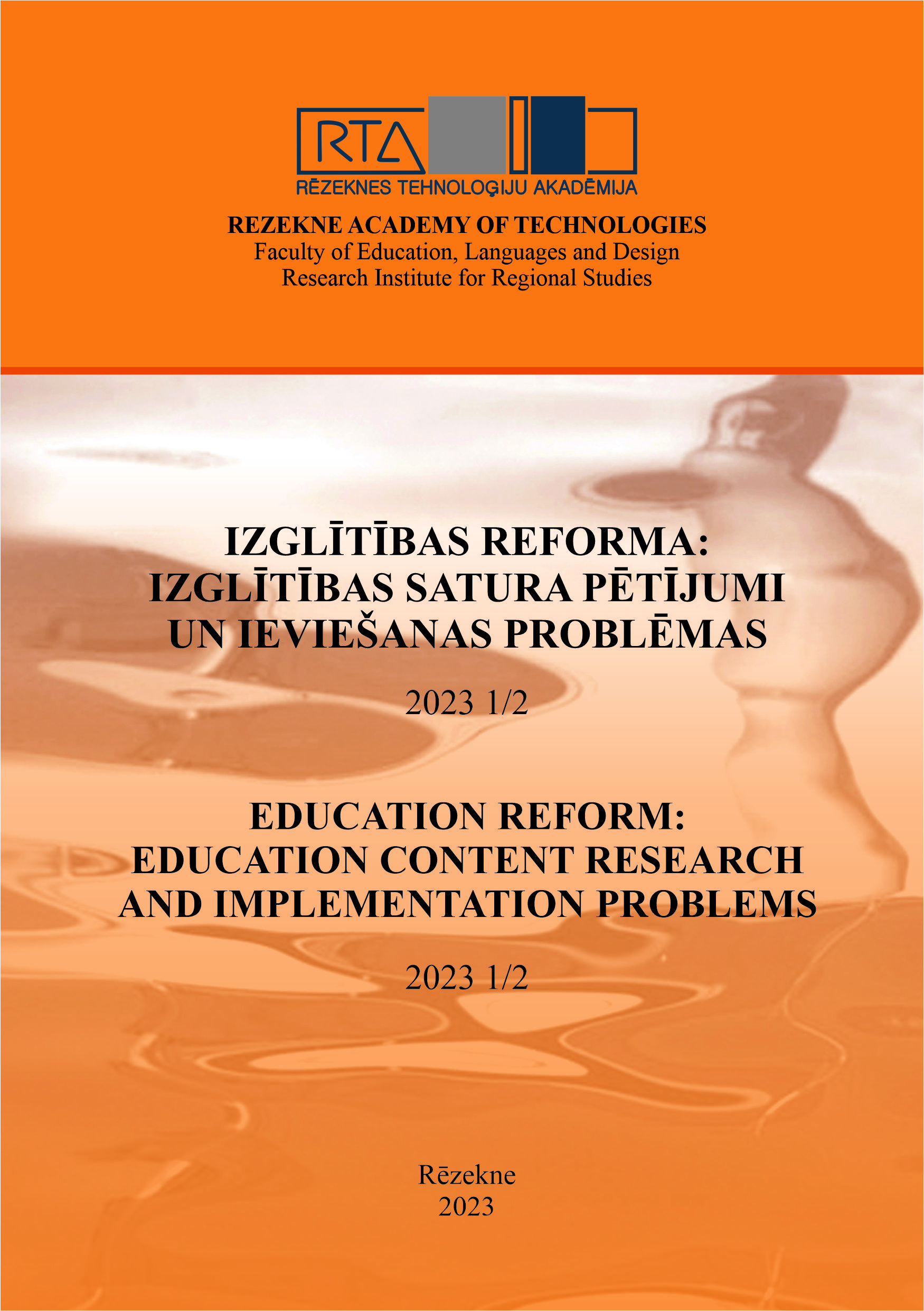IDENTIFICATION OF BEHAVIORAL PROBLEMS IN PRESCHOOL AGE CHILDREN
DOI:
https://doi.org/10.17770/er2023.1.7343Keywords:
behavioral problems, identification tool, pedagogue, preschoolAbstract
The aim of the research is to analyze the theoretical literature on the manifestations of behavior problems of preschool children and to develop and approve a child behavior problem identification tool for educators.
The research analyzes the theoretical literature and summarizes findings on the manifestations of behavioral problems of preschool children; analyzes the existing methods of identification of children's behavioral problems in preschool; a study was conducted on the identification of behavioral problems of preschool children and a child behavior problem identification tool developed.
References
Andersone, R., Plaude, A., Rutka, L., & Stikute, E. (2018). Rekomendācijas uzvedībai un sadarbībai klasē. Informatīvais materiāls. Rīga: PUMPURS. Pieejams: http://www.pumpurs.lv/lv/projekta_dalibniekiem
Achenbach T., & Rescorla L. (2000). ASEBA, Child Behaviour Checklist for Ages 1,5 – 5. University of Vermont. Pieejams: www.ASEBA.org (12.3.21)
Arslan, İ.B., Lucassen, N., & van Lier, P.A.C. et al. (2021). Early childhood internalizing problems, externalizing problems and their co-occurrence and (mal)adaptive functioning in emerging adulthood: a 16-year follow-up study. Soc Psychiatry Psychiatr Epidemiol 56, 193–206. DOI: https://doi.org/10.1007/s00127-020-01959-w
Bethere, D., Līdaka, A., Plostniece, A., Ponomorjova, J., &Striguna, S. (2013). Metodiskais materiāls pedagogiem darbam ar izglītojamiem, kuriem ir uzvedības traucējumi. Rīga: VISC. Pieejams: https://www.bti.gov.lv/lv/media/900/download
Bezbarodovs, Ņ. (2021). Emocionālās un uzvedības grūtības pirmsskolas vecuma bērniem. Rīga: Bērnu klīniskā universitātes slimnīca. Pieejams: https://www.izm.gov.lv/ lv/media/11657/download
Charach, A., Bélanger, S., McLennan, J., & Nixon, M. (2017). Screening for disruptive behaviour problems in preschool children in primary health care settings. Paediatrics & Child Health, 478–484. DOI: 10.1093/pch/pxx128
Delibalt, V.V., Degtyaryov, A.V., Dozortseva, E.G., Chirkina, R.V., Dvoryanchikov, N.V., Pimonov, V.A., & Malkin, D.A. (2017). Evaluation of cognitive functions, personality and regulatory sphere in minors with deviant and delinquent behavior within the authority of the psychological, medical and educational committee. International journal of cognitive research in science, engineering and education, 5(2), 107. DOI:10.5937/IJCRSEE1702107D
Ghandour, R. M., Sherman, L. J., Vladutiu, C. J., Ali, M. M., Lynch, S. E., Bitsko, R. H., & Blumberg, S. J. (2019). Prevalence and treatment of depression, anxiety, and conduct problems in US children. The Journal of pediatrics, 206, 256-267. DOI: https://doi.org/10.1016/j.jpeds.2018.09.021
Goodman, R., Ford, T., Simmons, H., Gatward, R., & Meltzer, H. (2000). Using the Strengths and Difficulties Questionnaire (SDQ) to screen for child psychiatric disorders in a community sample. The British Journal of Psychiatry, 177(6), 534-539. DOI:10.1192/bjp.177.6.534
Ģimenes studija. (2022). Bērnu Uzvedība: Psihiatrs Ņikita Bezborodovs. Facebook. Pieejams: https://fb.watch/jtq2r5Skxx/
Juliano, M., Werner, R. S., & Cassidy, K. W. (2006). Early correlates of preschool aggressive behavior according to type of aggression and measurement. Journal of Applied Developmental Psychology, 27(5), 395-410. DOI: https://doi.org/10.1016/ j.appdev.2006.06.008.
Jurgena, I. (2001). Vispārīgā pedagoģija. Rīga: SIA ‘’Izglītības soļi’’
Kalvāns, E. (2018). Attīstības psiholoģija. Mācību līdzeklis. RTA 2018. Pieejams: http://books.rta.lv/index.php/RTA/catalog/book/7
Latvijas Republikas Valsts Kontrole (2022). Bērniem ar uzvedības problēmām vai to iestāšanās risku un viņu ģimenēm nav pieejams nepieciešamais atbalsts. Pieejams: https://www.lrvk.gov.lv/lv/aktualitates/berniem-ar-uzvedibas-problemam-vai-to-iestasanas-risku-un-vinu-gimenem-nav-pieejams-nepieciesamais-atbalsts
LTV ziņu dienests (2022). Bērnu uzvedības problēmu risināšana Latvijā. YouTube. Pieejams: https://www.youtube.com/watch?v=KetHl5js4-Y
McDonald, S., Kehler, H.L., Tough, S.C. (2018). Risk factors for delayed social‐emotional development and behavior problems at age two: Results from the All Our Babies/Families (AOB/F) cohort. Health science report 1:e82. DOI: https://doi.org/10.1002/hsr2.82
Ogundele M.O. (2018). Behavioural and emotional disorders in childhood: A brief overview for paediatricians. World journal of clinical pediatrics, 7(1), 9–26. DOI: https://doi.org/10.5409/wjcp.v7.i1.9
Reddy, B.R., Pawar, J.M., Aundhakar, C. D., Mishra, L., & Goyal, P. (2016). Study of behavioral problems in preschool children. Medical Science and Clinical Research, 4(12), 14641–14649. DOI:10.18535/JMSCR/V4I12.56
Sam, N.M.S. (2013). ‘’Behavior Problem’’ in PsychologyDictionary.org. Pieejams: https://psychologydictionary.org/behavior-problem/
Shala, M. & Dhamo, M., (2013). Prevalence of Behavioural and Emotional Problems among Two to Five Years Old Kosovar Preschool Children—Parent’s Report. Scientific Research Psychology, 4, 12, 1008-1013. DOI: http://dx.doi.org/10.4236/psych.2013.412146
Skreitule-Pikše, I. (2011). Mātes kompetences izjūtas, mātes–bērna emocionālās pieejamības un bērna uzvedības izmaiņas pēc mātes piedalīšanās vecāku mācību programmā „Bērna emocionālā audzināšana”. Pieejams: https://dspace.lu.lv/dspace/handle/7/4762
Slimību profilakses un kontroles centrs (2016). Starptautiskā statistiskā slimību un veselības problēmu klasifikācija. 1. sējums Pieejams: https://ssk10.spkc.gov.lv/rsc/SSK_1_Ievads_ 20190507.pdf
VBTAI (2016). Diagnosticēšanas materiāls bērnu uzvedības traucējumu un saskarsmes grūtību diagnosticēšanai speciālistiem, kas iesaistīti atbalsta sniegšanā bērniem ar uzvedības traucējumiem un saskarsmes grūtībām izglītības iestādēs, aprūpes iestādēs, bāriņtiesās un pašvaldību iestādēs. Pieejams: https://www.bti.gov.lv/lv/media/ 900/download
VBTAI (2021). Metodoloģija bērnu ar uzvedības traucējumiem un saskarsmes grūtībām agresijas un vardarbības mazināšanai un sociālās iekļaušanas veicināšanai. Pieejams: https://www.bti.gov.lv/lv/media/912/download
Wlodarczyk, O., Pawils,S., Metzner, F., Kriston, L., Klasen, F., Sieberer, U. & the BELLA study group. (2017). Risk and protective factors for mental health problems in preschool-aged children: cross-sectional results of the BELLA preschool study. Child and Adolescent Psychiatry and Mental Health, 11, Article No. 12. Pieejams: https://link.springer.com/article/10.1186/s13034-017-0149-4
Zavackis A. (2022). "Deviances socioloģija". Nacionālā enciklopēdija. Pieejams: https://enciklopedija.lv/skirklis/2633-deviances-socioloģija






